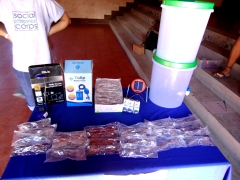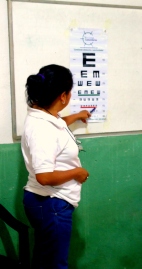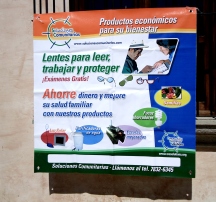The ancient Chinese proverb, “Give a man a fish, you feed him for a day. Teach a man to fish, you feed him for a lifetime” is often used in blogs and articles relating to social business. The newly emerging sector of social business, MicroConsignment, takes this saying one step further. MicroConsignment business models (MCM) “teach a man to fish” and then they give him the fishing pole, the boat, the bait, and even a few fishing partners.
The MCM borrows many values and methods from both micro-credit and micro-franchise. It utilizes a tested and proven business model, emphasizes a local approach, and does not require collateral.
In a micro-franchise model, the entrepreneur must borrow money in order to purchase the products they plan to sell. This initial investment provides a barrier to entry for those at the bottom of the pyramid. In addition, the personal risk associated with not being able to sell all of the products you purchase is very high.
The MCM works the opposite way. The entrepreneur is provided with the products at no cost. Once the product is sold, the entrepreneur pays back the organization, pockets a portion of the profit, and restocks in order to sell more. This model is ideal for those living at the bottom of the pyramid since it requires no monetary investment, allows for flexibility in schedule, has minimal barriers to entry, and provides entrepreneurial training and experience that act as a stepping stone to future entrepreneurial activities.
no cost. Once the product is sold, the entrepreneur pays back the organization, pockets a portion of the profit, and restocks in order to sell more. This model is ideal for those living at the bottom of the pyramid since it requires no monetary investment, allows for flexibility in schedule, has minimal barriers to entry, and provides entrepreneurial training and experience that act as a stepping stone to future entrepreneurial activities.
 no cost. Once the product is sold, the entrepreneur pays back the organization, pockets a portion of the profit, and restocks in order to sell more. This model is ideal for those living at the bottom of the pyramid since it requires no monetary investment, allows for flexibility in schedule, has minimal barriers to entry, and provides entrepreneurial training and experience that act as a stepping stone to future entrepreneurial activities.
no cost. Once the product is sold, the entrepreneur pays back the organization, pockets a portion of the profit, and restocks in order to sell more. This model is ideal for those living at the bottom of the pyramid since it requires no monetary investment, allows for flexibility in schedule, has minimal barriers to entry, and provides entrepreneurial training and experience that act as a stepping stone to future entrepreneurial activities. The MCM has spread relatively quickly throughout the developing world and has found great success in India, Africa (particularly South Africa), and parts of Latin America. The MCM was developed less than a decade ago in the rural village of Nebaj, Guatemala by a Peace Corps volunteer named Greg Van Kirk. The idea of MicroConsignment was born when Greg donated the profits from the tourism business he created (as part of his peace corps assignment) to a wood-burning stove project. He quickly realized that his donations were not sustainable and began to locally manufacture the stoves instead. He found local entrepreneurs to market and sell the stoves (on consignment) to low income families in nearby villages. The stoves were interest-free and micro-payment options were made available. Greg created a model in which high-quality, health-enhancing products were brought to rural villagers at affordable prices by local individuals who were trained to be entrepreneurs and provided with income-generating opportunities.
The MCM has spread relatively quickly throughout the developing world and has found great success in India, Africa (particularly South Africa), and parts of Latin America. The MCM was developed less than a decade ago in the rural village of Nebaj, Guatemala by a Peace Corps volunteer named Greg Van Kirk. The idea of MicroConsignment was born when Greg donated the profits from the tourism business he created (as part of his peace corps assignment) to a wood-burning stove project. He quickly realized that his donations were not sustainable and began to locally manufacture the stoves instead. He found local entrepreneurs to market and sell the stoves (on consignment) to low income families in nearby villages. The stoves were interest-free and micro-payment options were made available. Greg created a model in which high-quality, health-enhancing products were brought to rural villagers at affordable prices by local individuals who were trained to be entrepreneurs and provided with income-generating opportunities. In 2004, Greg founded the NGO, Community Enterprise Solutions (CES), to test, develop, implement and expand the MCM in Guatemala and beyond. Two years later, CES established Soluciones Comunitarias (SolCom), a Guatemalan owned social enterprise. SolCom has offices in 6 regions of Guatemala and sells more than 20 products including cook stoves, water filters, solar lamps, and vegetable seeds. SolCom’s most popular product however is their eyeglasses which they offer alongside free eye exams (which the local entrepreneurs are trained to administer).
 Everyone has their own opinion on how to best eliminate poverty. Greg Van Kirk found an innovate way to both empower and employ locals and to bring affordable products to those in need.
Everyone has their own opinion on how to best eliminate poverty. Greg Van Kirk found an innovate way to both empower and employ locals and to bring affordable products to those in need.“People grow out of poverty when they create small businesses that employ their neighbors. Nothing else lasts.” -Thomas Friedman